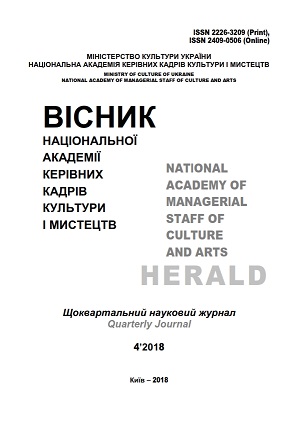Post-Totalitarian Practices of Soviet and Polish Comedy Films of 1960 –1980s.
Post-Totalitarian Practices of Soviet and Polish Comedy Films of 1960 –1980s.
Author(s): Maryna Borisivna StoliarSubject(s): Post-War period (1950 - 1989), Film / Cinema / Cinematography, History of Art
Published by: Національна академія керівних кадрів культури і мистецтв
Keywords: totalitarian; post-totalitarian practices; laughter; laughter culture; Soviet comedy films; Polish comedy films;
Summary/Abstract: The purpose of the research. The processes of integration of the post-socialist countries into European cultural space have different speed and rhythm as well as controversial vectors. One of the crucial factors that define the intensity of these processes, is a culture’s maturity in understanding different aspects of the totalitarian past, and also a certain level of development of reflective practices of the political and cultural elite. The artifacts of comedy films show the highest level of concentration of the anti-totalitarian discourse in the culture of post-totalitarian times. They also reveal certain mental differences of the representatives of various post-totalitarian societies. The article aims at making the comparative analysis of the Soviet and Polish comedy films of 1960–1980s. This analysis clearly shows both common and different characteristics of the anti-totalitarian practices of these cultures. The methodology. The phenomenon of laughter is studied with the help of different paradigms of the laughter philosophy, namely, the theories of incongruity, of relief, of superiority etc.; all these theories are seen as mutually complementary. The legacy of G. Daneliya and Bareja is interpreted with the help of the crypto-religious methodology. We also use some methodological practices of M. Bakhtin and representatives of the contemporary Bakhtin studies. The scientific novelty. For the first time ever the material is analyzed in the philosophical and culturological context and in the aspect of the anti-totalitarian discourse. Conclusion. We state and research the comparatively early appearance of the philosophical reflection in the Polish comedy of such a cause of totalitarian practices as the atomization of an individual (H. Arendt); analyze the original semantics of the critical discourse of G. Daneliya’s comedy “33”; reveal the anti-totalitarian subtexts of some other comedies.
Journal: Вісник Національної академії керівних кадрів культури і мистецтв
- Issue Year: 2018
- Issue No: 4
- Page Range: 103-108
- Page Count: 6
- Language: English

